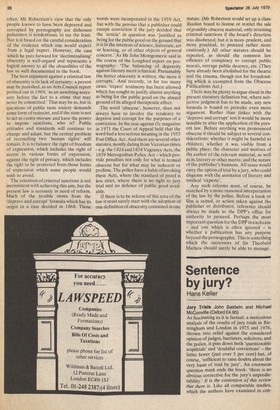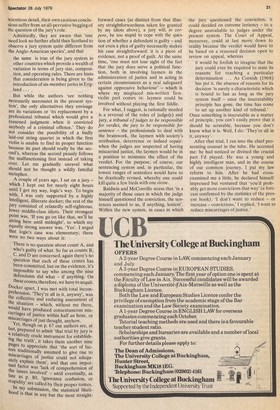Sentence by jury?
Hans Keller
Jury Trials John Baldwin and Michael McConville (Oxford £4.95) As fascinating as it is factual: a meticulous analysis of the results of jury trials in Birmingham and London in 1975 and 1976, thrown into relief against the considered opinion of judges, barristers, solicitors, and the police, it pins down both 'questionable acquittals' and 'doubtful convictions' — the latter fewer (just over 5 per cent) but, of course, 'sufficient to raise doubts about the very basis of trial by jury'. An enormous question mark ends the book: 'there is no obvious corrective for the jury's unpredictability.' It is the contention of this review that there is. Like all comparable studies, which the authors have examined in con scientious detail, their own cautious conclusions suffer from an all-pervasive begging of the question of the jury's role.
Admittedly, they are aware that 'one need look no further afield than Scotland to observe a jury system quite different from the Anglo-American species', and that the same is true of the jury system in other countries which provide a wealth of variation in terms of jury size, composition, and operating rules. There are hints that consideration is being given to the introduction of six-member juries in England .
But while the authors 'see nothing necessarily sacrosanct in the present system', the only alternatives they envisage are its variations or its replacement by a professional tribunal which would give a reasoned judgment when it convicted anybody of a criminal offence.' They do not consider the possibility of a badly laid-out string quartet in which the first violin is unable to find its proper function because its part should really be the second's, whereas the second piously follows the malfunctioning first instead of taking over. Let me gradually unravel what should not be thought a wildly fanciful metaphor.
A couple of years ago, I sat on a jury — Which I kept out for nearly eight hours until I got my way, logic's way. To begin With, I was only supported by a highly intelligent, illiterate docker; the rest of the Jury consisted of relaxedly self-righteous, lower middle-class idiots. Their strongest point was, 'If you go on like that, we'll be sitting here until midnight', to which my equally strong answer was, 'Yes'. I urged that logic's case was elementary; there were no two ways about it: There is no question about count A, and who's guilty of what. So far as counts B, C, and D are concerned, again there's no question that each of these crimes has been committed, but on the evidence, it's impossible to say who among the nine defendants did what — if anything. On these counts,therefore, we have to acquit. Docker apart, I was met with total incomprehension. 'They're all in it, anyway', was the collective and enduring assessment of the situation — which, without me there, would have produced consentaneous miscarriages of justice within half an hour, or miscarriages of just thought, anyhow. Yet, though on p. 67 our authors are, at last, prepared to admit 'that trial by jury is a relatively crude instrument for establishing the truth', it takes them another nine Pages to appreciate that 'the sort of factors traditionally assumed to give rise to miscarriages of justice could not adequately explain them', and that one important factor was 'lack of comprehension of the issues involved' — until eventually, as late as p. 80, 'ignorance confusion, or stupidity are called by their proper names. In my submission, the statistical likelihood is that in any but the most straight forward cases (as distinct from that illusory straightforwardness taken for granted by my idiots above), a jury will, in corpore, be too stupid to cope with the question of whether a defendant is guilty — and not even a plea of guilty necessarily makes his case straightforward: it is a piece of evidence, not a proof of guilt. At the same time, 'one must not lose sight of the fact that the jury does serve a political function, both in involving laymen in the administration of justice and in acting in certain circumstances as a real safeguard against oppressive behaviour' — which is where my misplaced mis-written firstviolin part comes in: laymen could be involved without playing the first fiddle.
For what, I suggest, is rationally needed is a reversal of the roles of judge(s) and jury, a tribunal of judges to be responsible for verdict, the jury to be responsible for sentence — the professionals to deal with the brainwork, the laymen with society's retribution, deterrence or indeed repair: when the judges are suspected of having miscarried justice, the laymen would be in a position to minimize the effect of the verdict. For the purpose, of course, our sentencing system and, in particular, the lowest ranges of senterices would have to be drastically revised, whereby one could kill quite a few birds with one stone.
Baldwin and McConville stress that 'in a majority of those cases in which the judge himself questioned the conviction, the sentences seemed to us, if anything, lenient'. Within the new system, in cases in which the jury questioned the conviction, it could decided on extreme leniency — to a degree unavailable to judges under the present system. The Court of Appeal, moreover, could at last move down to reality because the verdict would have to be based on a reasoned decision open to review on appeal, whereas it would be foolish to imagine that the jury could ever be required to state its reasons for reaching a particular determination . .. As Cornish (1968) has put it, the absence of reasons for its decision 'is surely a characteristic which is bound to last as long as the jury system itself — once the inscrutability principle has gone, the time has come to set up another kind of tribunal.'
Once something is inscrutable as a matter of principle, you can't easily prove that it should be scrutable, because you don't know what it is. Well, I do: 'They're all in it, anyway'.
After that trial, I ran into the chief prosecuting counsel in the tube. He accosted me: he had noticed or divined the crucial part I'd played. He was a young and highly intelligent man, and in the course of our common journey, I put my law reform to him. After he had crossexamined me a little, he declared himself impressed but ventured that 'you'd prob ably get more convictions that way' (a forecast confirmed by the statistics of the pres ent book). 'I don't want to reduce — or increase — convictions,' I replied. want to reduce miscarriages of justice.'







































 Previous page
Previous page